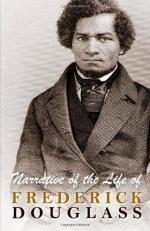me six cents, to encourage me. It had the opposite
effect. I regarded it as a sort of admission of
my right to the whole. The fact that he gave
me any part of my wages was proof, to my mind, that
he believed me entitled to the whole of them.
I always felt worse for having received any thing;
for I feared that the giving me a few cents would
ease his conscience, and make him feel himself to be
a pretty honorable sort of robber. My discontent
grew upon me. I was ever on the look-out for
means of escape; and, finding no direct means, I determined
to try to hire my time, with a view of getting money
with which to make my escape. In the spring of
1838, when Master Thomas came to Baltimore to purchase
his spring goods, I got an opportunity, and applied
to him to allow me to hire my time. He unhesitatingly
refused my request, and told me this was another stratagem
by which to escape. He told me I could go nowhere
but that he could get me; and that, in the event of
my running away, he should spare no pains in his efforts
to catch me. He exhorted me to content myself,
and be obedient. He told me, if I would be happy,
I must lay out no plans for the future. He said,
if I behaved myself properly, he would take care of
me. Indeed, he advised me to complete thoughtlessness
of the future, and taught me to depend solely upon
him for happiness. He seemed to see fully the
pressing necessity of setting aside my intellectual
nature, in order to contentment in slavery. But
in spite of him, and even in spite of myself, I continued
to think, and to think about the injustice of my enslavement,
and the means of escape.
About two months after this, I applied to Master Hugh
for the privilege of hiring my time. He was not
acquainted with the fact that I had applied to Master
Thomas, and had been refused. He too, at first,
seemed disposed to refuse; but, after some reflection,
he granted me the privilege, and proposed the following
terms: I was to be allowed all my time, make
all contracts with those for whom I worked, and find
my own employment; and, in return for this liberty,
I was to pay him three dollars at the end of each
week; find myself in calking tools, and in board and
clothing. My board was two dollars and a half
per week. This, with the wear and tear of clothing
and calking tools, made my regular expenses about
six dollars per week. This amount I was compelled
to make up, or relinquish the privilege of hiring
my time. Rain or shine, work or no work, at the
end of each week the money must be forthcoming, or
I must give up my privilege. This arrangement,
it will be perceived, was decidedly in my master’s
favor. It relieved him of all need of looking
after me. His money was sure. He received
all the benefits of slaveholding without its evils;
while I endured all the evils of a slave, and suffered
all the care and anxiety of a freeman. I found
it a hard bargain. But, hard as it was, I thought
it better than the old mode of getting along.




